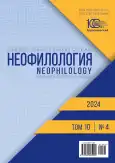Constructive-style vectors in digital advertising text: transformation and interaction
- Authors: Uskova O.A.1, Valieva I.V.1
-
Affiliations:
- Moscow State Linguistic University
- Issue: Vol 10, No 4 (2024)
- Pages: 987-996
- Section: MEDIA COMMUNICATIONS AND JOURNALISM
- URL: https://journal-vniispk.ru/2587-6953/article/view/295637
- DOI: https://doi.org/10.20310/2587-6953-2024-10-4-987-996
- ID: 295637
Cite item
Full Text
Abstract
INTRODUCTION. The study is devoted to the problem of digital advertising text transformation under the influence of constructive-style vectors (CSV) of bookishness, mass media and colloquialism. The purpose of the study is to identify the interaction features of various CSV in modern digital advertising.MATERIALS AND METHODS. The object of the study is digital advertising texts. The manifestations of CSVs of bookishness, mass media, and colloquialism at the lexical, morphological, and syntactic levels are analyzed. To achieve this goal, methods of lingual-stylistic, discourse, contextual, and comparative analysis, as well as the method of continuous sampling, are used.RESULTS AND DISCUSSION. The study identified ways to mix the means of various CSVs to enhance the effectiveness of advertising communication. It also established the influence of digital technologies on the formation of new trends in creating advertising texts, such as personalization, multimodality, and interactivity.CONCLUSION. The results of the study can be used by copywriters and marketers as tools for creating more effective advertising texts in a digital environment. Additionally, the obtained data can be applied in developing educational programs in digital marketing, copywriting, and advertising, providing students with up-to-date knowledge of modern trends in advertising communication. For researchers in linguistics and communication, the work provides new material for further study of language transformation in the digital environment and its impact on communication effectiveness. Prospects for further research are related to studying the transformation of CSVs in the context of the development of artificial intelligence and virtual reality in advertising.
About the authors
O. A. Uskova
Moscow State Linguistic University
Email: olgauskova@mail.ru
ORCID iD: 0000-0002-9132-9949
Dr. Sci. (Philology), Associate Professor, Professor of Russian as a Foreign Language Department, Director of Testing Foreign Citizens Center
1 bldg 38 Ostozhenka St., Moscow, 119034, Russian FederationI. V. Valieva
Moscow State Linguistic University
Author for correspondence.
Email: ilona-valieva-99@mail.ru
ORCID iD: 0009-0006-9756-8314
Lecturer of Russian as a Foreign Language Department
1 bldg 38 Ostozhenka St., Moscow, 119034, Russian FederationReferences
- Evstaf’ev V.A., Abaev A.L., Tyukov M.A. Creativity in Advertising. Moscow, Publishing and Trading Corpora-tion “Dashkov and Co”, 2023, 390 p. (In Russ.) https://elibrary.ru/ltsarc
- Lemeshko T.B. Digital Technologies in Advertising. Moscow, Russian State Agrarian University –Moscow Agricultural Academy named after K.A. Timiryazev Publ., 2019, 100 p. (In Russ.) https://doi.org/10.34677/2019.034, https://elibrary.ru/pkhcen
- Kostomarov V.G. Our Language in Action: Essays on Contemporary Russian Stylistics. Moscow, Gardariki Publ., 2005, 287 p. (In Russ.) https://elibrary.ru/xhjhtj
- Aganina R.N., Andronova T.A. Internet-advertising in the age of digitalization. Vestnik Universiteta imeni O.E. Kutafina (MGYUA) = Courier of the Kutafin Moscow State Law University (MSAL), 2020, no. 7 (71), pp. 44-52. (In Russ.) https://doi.org/10.17803/2311-5998.2020.71.7.044-052, https://elibrary.ru/hbtdch
- Terskikh M.V., Alekseeva A.S. Native advertising in food blogs: formats, genres, impact tools. Vestnik Omskogo gosudarstvennogo pedagogicheskogo universiteta. Gumanitarnye issledovaniya = Review of Omsk State Peda-gogical University. Humanitarian Research, 2023, no. 1 (38), pp. 91-96. (In Russ.) https://doi.org/10.36809/2309-9380-2023-38-91-96, https://elibrary.ru/izpipy
- Shvyrev A.D. Internet advertising as one of the most important tools of modern marketing. Nauchnyi zhurnal = Science Magazine, 2020, no. 3 (48), pp. 40-43. (In Russ.) https://elibrary.ru/rxnrpy
- Beregovskaya T.A., Grishaeva S.A. Generation Z: consumer behavior in digital ecosystem. Vestnik Universiteta, 2020, no. 1, pp. 92-99. (In Russ.) https://doi.org/10.26425/1816-4277-2020-1-92-99, https://elibrary.ru/qdhwgc
- Uskova O.A., Shatalova L.S., Shatalova N.S. Metalanguages of professional communication: integrative de-scription model. Vestnik Moskovskogo gosudarstvennogo lingvisticheskogo universiteta. Gumanitarnye nauki = Vestnik of Moscow State Linguistic University. Humanities, 2022, no. 4 (859), pp. 93-98. (In Russ.) https://doi.org/10.52070/2542-2197_2022_4_859_93, https://elibrary.ru/nfqrbo
- Kolokol’tseva T.N. Dialogism in the genres of Internet communication (chat, forum, blog). Zhanry rechi = Speech Genres, 2016, no. 2, pp. 97-105. (In Russ.) https://doi.org/10.18500/2311-0740-2016-2-14-97-105, https://elibrary.ru/xuvjid
- Kushneruk S.L. Cultural identity of discourse worlds in British and Russian advertising. Vestnik Leningradskogo gosudarstvennogo universiteta im. A.S. Pushkina = Pushkin Leningrad State University Journal, 2014, vol. 1, no. 1, pp. 210-220. (In Russ.) https://elibrary.ru/secevf
- Shesterkina L.P., Lobodenko L.K. Basic approaches to the production of a universal media text in online media. Vestnik Yuzhno-Ural’skogo gosudarstvennogo universiteta. Seriya: Lingvistika = Bulletin of the South Ural State University. Series: Linguistics, 2013, vol. 10, no. 2, pp. 42-46. (In Russ.) https://elibrary.ru/raithn
- Morozova A.A. Verbal and iconic components of targeted advertising in the social network VKontakte. Znak: problemnoe pole mediaobrazovaniya = Sign: Problematic Field in Mediaeducation, 2020, no. 1 (35), pp. 58-64. (In Russ.) https://elibrary.ru/aufgpw
- Mozhaev A.V., Sidorov P.Yu. Personalization as a factor of influence on user perception of internet adver-tisement. Kommunikatsii. Media. Dizain = Communications. Media. Design, 2018, vol. 3, no. 3, pp. 142-161. (In Russ.) https://elibrary.ru/bycxxu
- Zagidullina M.V. Multimodality: to the question of terminological definition. Znak: problemnoe pole mediao-brazovaniya = Sign: Problematic Field in Mediaeducation, 2019, no. 1 (31), pp. 181-188. (In Russ.) https://elibrary.ru/gbswk
- Vaserchuk Yu.A. Innovative approaches to the development of advertising printed materials. Interactivity. Izvestiya vysshikh uchebnykh zavedenii. Problemy poligrafii i izdatel'skogo dela = News of Higher Educational Institutions. Problems of Printing and Publishing, 2010, no. 6, pp. 119-129. (In Russ.) https://elibrary.ru/pmdziv
Supplementary files









